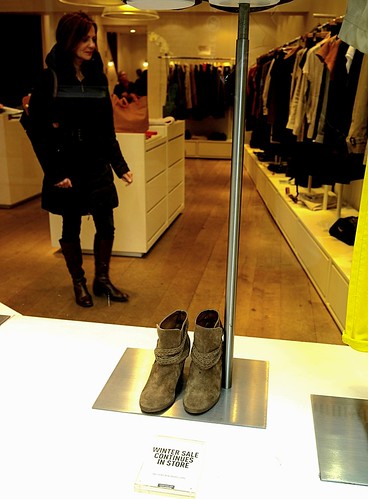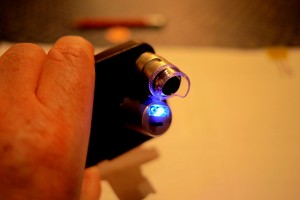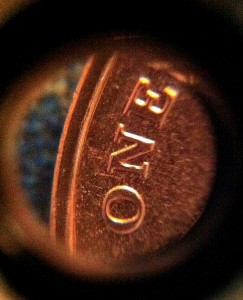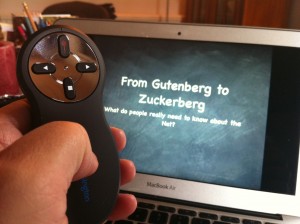From web pages to bloatware
This morning’s Observer column.
In the beginning, webpages were simple pages of text marked up with some tags that would enable a browser to display them correctly. But that meant that the browser, not the designer, controlled how a page would look to the user, and there’s nothing that infuriates designers more than having someone (or something) determine the appearance of their work. So they embarked on a long, vigorous and ultimately successful campaign to exert the same kind of detailed control over the appearance of webpages as they did on their print counterparts – right down to the last pixel.
This had several consequences. Webpages began to look more attractive and, in some cases, became more user-friendly. They had pictures, video components, animations and colourful type in attractive fonts, and were easier on the eye than the staid, unimaginative pages of the early web. They began to resemble, in fact, pages in print magazines. And in order to make this possible, webpages ceased to be static text-objects fetched from a file store; instead, the server assembled each page on the fly, collecting its various graphic and other components from their various locations, and dispatching the whole caboodle in a stream to your browser, which then assembled them for your delectation.
All of which was nice and dandy. But there was a downside: webpages began to put on weight. Over the last decade, the size of web pages (measured in kilobytes) has more than septupled. From 2003 to 2011, the average web page grew from 93.7kB to over 679kB.
Quite a few good comments disagreeing with me. In the piece I mention how much I like Peter Norvig’s home page. Other favourite pages of mine include Aaron Sloman’s, Ross Anderson’s and Jon Crowcroft’s. In each case, what I like is the high signal-to-noise ratio.
How things change…
From Quentin’s blog.
There’s a piece in Business Insider based on an interesting fact first noted by MG Siegler. It’s this:
Apple’s iPhone business is bigger than Microsoft
Note, not Microsoft’s phone business. Not Windows. Not Office. But Microsoft’s entire business. Gosh.
As the article puts it:
The iPhone did not exist five years ago. And now it’s bigger than a company that, 15 years ago, was dragged into court and threatened with forcible break-up because it had amassed an unassailable and unthinkably profitable monopoly.
Wow! It seems only yesterday when Microsoft was the Evil Empire.
Regulating the Net
This evening I went to an interesting lecture on “The challenges of regulating the Internet” given by Simon Hampton, who is Google’s Director of Public Policy for Northern Europe. He was, he insisted, speaking only “in a personal capacity” and the audience, for the most part, took him at his word. His thesis was that in the technology business the greatest challenge is “the transition from scarcity to abundance” and that policy-makers haven’t taken this transition on board.
The metaphor he used to communicate abundance was the hoary story of the guy who invents the game of chess and who, when asked by the Emperor what he would like as a reward requests one grain of rice on the first square, two on the second, four on the third, etc. You know the story: according to Hampton by the time you get to the 64th square the amount of rice needed is the size of Everest. At which point my neighbour, David Cleevely, nudged me and said that he had worked it out and it was enough rice to cover the entire surface of the earth to a depth of nine inches! But it turned out that, for Hampton, the metaphor also has a chronological dimension: we’re just about half-way through the chessboard.
As befits someone who spends a lot of time in Brussels arguing with the anti-trust division of the European Commission, he has a pretty jaundiced view about what goes on there. But he made a good point, namely that the EU finds it easiest to regulate in new areas simply because regulating in existing areas means dealing with the reluctance of member states to change their existing laws. The result is that the Commission tends to to move too quickly to legislation (in the form of Directives) in emerging areas. Examples: the e-Money Directive; the e-Signature Directive; and, now, the Privacy Directive. Plus, of course, the idiocy of applying to the Net concepts designed for regulating TV broadcasters.
He then went on to list the four big companies that have “embraced abundance” — Apple, Amazon, Google and Facebook. They all operate on massive scale and have an interest in a bigger, freer Internet — though they have only recently woken up to the necessity of lobbying for this in the corridors of power (which is why the campaign against SOPA was so significant). In this context, Hampton claimed, size really matters — which is why moving into the second half of the chessboard is so significant. “The larger the haystack, the easier it is to find the needle.” (Not sure I followed his logic here.)
He was interesting on the subject of lobbying — which of course is a large part of his job and he defined it as trying to persuade legislators and policy-makers that their concept of the public interest should be realigned with those of industrial lobbies. People in declining industries tend to scream, and thereby gain public — and media and legislators’ — attention; in contrast, people in new, growing industries are too busy getting on with it — which probably explains why the big Internet companies were so slow to get their lobbying act together in Washington.
Finally, Hampton moved to the question of how to rethink policy-making in the context of abundance. In his opinion, there’s no need to change the broad objectives of public policy. The key switch that is needed is for policy-makers to “embrace abundance”.
What would that mean in practice? He suggested three general principles:
In the Q&A the main topics were (a) the cluelessness of legislators in relation to the Internet, and (b) concerns about privacy (hardly surprising given this). I made the point that legislators have always been clueless, so there’s nothing new here. (I quoted Bertrand Russell’s argument about why an MP couldn’t be more stupid than his constituents — “because the more stupid he is, the more stupid they are to elect him”.) The point is that in a representative democracy, Members of Parliament should not be expected to be knowledgeable about everything. It’s Parliament, as an institution, that needs to be knowledgeable — which is why we need evidence-based policy-making in relation to Internet regulation, intellectual property, etc. And, to date, we’ve had very little of that.
So the battle for an open Internet continues.
Form vs function in journalism
Just watched, despairingly, Newsnight on BBC2 grappling with the “death of the newspaper”. The peg for this feeble item was the arrival of the Digger at Luton airport. He has, it seems, flown the Atlantic in order to reassure his serfs and placemen at the Sun (a newspaper) that he is not going to close it down.** The Newsnight item followed the usual recipe: a short film report followed by a studio ‘discussion’ with three guests: a former tabloid editor, a doughty female hack (Joan Smith) and a young gel in impossibly high heels who is the UK head of the Huffington Post, a parasitic online creation that feeds on proper journalism.
The really annoying thing about the discussion was the way it failed to distinguish between format and function. The thing we need to preserve is not the newspaper (a form which was the product of a technological accident and a particular set of historical circumstances) but the function (provision of free, independent and responsible journalism). Once upon a time, publishing in print was the only way to ensure that the product of the function reached a public audience. But those days may be ending. The organisations traditionally known as “newspapers” need to transform themselves into journalistic outfits that produce a range of outputs, one of which — but only one of which — may be a printed paper.
The other thing that those who run newspapers need to realise is that digital technology implies businesses that earn much lower margins than analogue businesses did. In the old days, newspapers were often licences to print money. (The Digger’s Sun still is.) But in every industry where digital technology has taken hold, margins have shrunk. Could you support a newsroom of 120 journalists — plus all the material and distribution expenses that go with producing a print product — on the revenues that a newspaper website currently earns? Answer: no. But could you support a newsroom with 80 journalists and a purely online offering with the same revenues? Answer: possibly — provided you were prepared to settle for a modest return (say 5%) on investment.
**Later: Murdoch announced that he would be setting up a Sunday Sun — a continuation of the Screws of the World by other means. This was hailed by the mainstream media as a bold, defiant and possibly inspired tactic. I’m not so sure: it’s just possible that the Murdoch brand is now so toxic that the new gamble won’t wash. An alternative reading is that the old guy is finally losing his marbles. If the US laws against corrupt payments are triggered by the most recent developments (the arrest of Sun journalists on suspicion of making such payments to public officials) then the supine directors and shareholders of News International may finally be moved to, er, move.
iMicroscope
The product ecosystem that surrounds Apple iDevices reminds me of the Peace of God as described in the Bible — in that “it passeth all understanding”. This is an add-on for the iPhone4 (and 4S) that turns it into a microscope.
Well, sort-of.
The only thing I could find to test it when it arrived was a penny. This is how it came out.
Somehow, I don’t think it’ll make me into a latter-day Leeuwenhoek. But it’s fun.
Telling it like it is
Just came on this in Aaron Sloman’s wonderful home page:
What should I write if asked to act as an academic referee, and the invitation requests me to assess the impact of the candidate’s work?
“I am not interested in impact, only quality of research, which does not always correlate with impact, since the latter is often subject to fashion and transient funding policies, etc. If you want a study of impact you would do better to consult a social scientist. Moreover high impact as measured by citations is often a consequence of making mistakes that many other people comment on.***
Many great research achievements could not possibly be assessed for their impact until many years later, in some cases long after the death of the researcher (e.g. Gregor Mendel).I’ll tell you what I think about the research quality: things like the depth, difficulty, and importance of the questions addressed, the originality, clarity, precision and explanatory power of the theories developed, and how well they fit known facts, as far as I can tell. If there are engineering products I may have some comments on their contribution to research. I shall not be able to evaluate their contribution to wealth or happiness.”
Thanks to Seb Schmoller for the link.
***Footnote: Really acute observation this. One of the most cited research papers in recent history is the infamous MMR paper published by the Lancet.
MIT launches free online courses — and gives credentials
This from BBC News:
MIT, along with many other leading universities, makes its course material available online, but the MITx scheme takes this a step further by creating an accredited course specifically for online students.
Study materials and the awarding of grades are all provided online.
Before Christmas, the Boston-based university announced its intention to create MITx.
On Monday it set out how this will be put into practice, with the creation of the course 6.002x: Circuits and Electronics, based on the campus-based course of the same name.
This is not a “watered down” version of the campus course or “any less intense”, says a university spokesman.
The main difference is that the MITx version has been designed for online students, with a virtual laboratory, e-textbooks, online discussions and videos that are the equivalent of a lecture. It is expected to take 10 hours per week and will run until June.
Er, great news and all that. But regular readers will have seen it somewhere before.
Untethering the presenter
I’m not a fan of PowerPoint etc. (for serious reasons and frivolous ones) but because of my book
I’ve been doing quite a few talks and using Keynote as a way of providing some structure. I eventually realised that one of the reasons I hate using presentation software is that I felt tethered to my Mac — which is ridiculous given that (a) I hate tethered devices in other contexts and (b) simple wireless solutions are available — like this Kensington Wireless pointer
. It communicates using 802.11 (so no line of sight or range problems), runs on 2 AAA batteries, plugs-and-plays with my Mac, has an inbuilt laser pointer (complete with H&S warnings) and — neatest of all — has a slot into which the USB dongle fits when not in use.
I got one recently and it does what it says on the tin. Then fell to wishing I was quicker on the uptake: I should have got one of these ages ago.
Consent of the Networked
I’ve just got Rebecca MacKinnon’s new book and am looking forward to reading it. But at the same time as it arrived I also got notification of her talk at the Boston launch of the book. It’s vintage MacKinnon: intelligent, informed, perceptive. I particularly like her concept of the “Sovereigns of Cyberspace” — Zuckerberg, Bezos, Page, Brin, Apple, Microsoft. I also like her use of the “information ecology” metaphor: we’ve moved from an ecosystem characterised by scarcity (a desert) to one characterised by abundance (a rain-forest) and the challenge is to devise a system of governance for that.
John Kampfner’s review is here.





